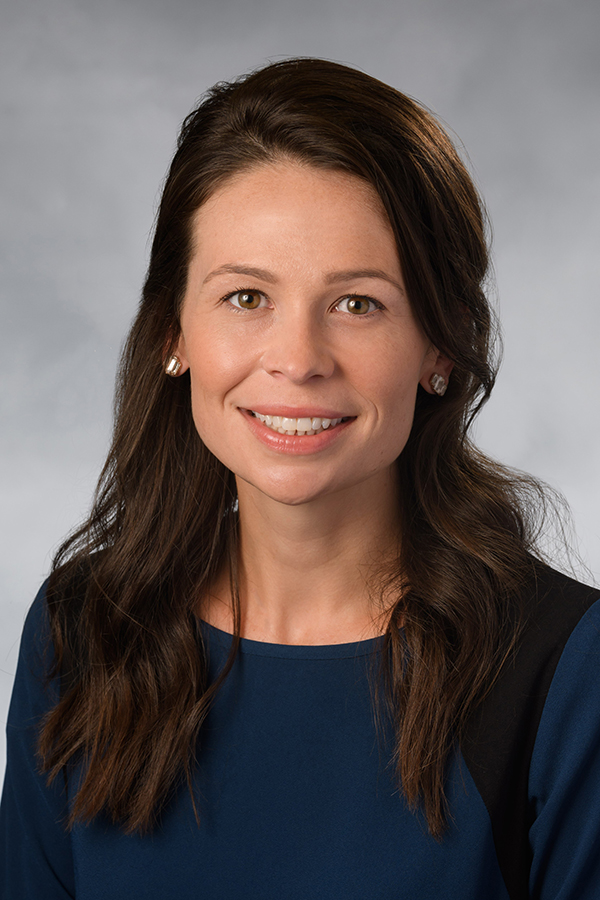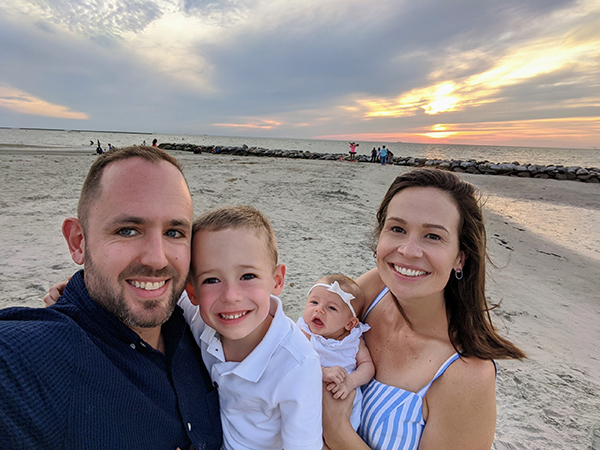Alumni highlights: "VCU prepared me incredibly well"
Learn more about our Department of Internal Medicine featured alumni.
Alumna
Krista Edelman, M’11, H'14
Krista Edelman, M'11, H'14, an alumna of VCU School of Medicine and Internal Medicine Residency Program
 New affiliate faculty member Krista Edelman, M’11, graduated from the VCU School of Medicine and its internal medicine residency program, during which she spent a year as a chief resident and directed the residency program’s women’s health track.
New affiliate faculty member Krista Edelman, M’11, graduated from the VCU School of Medicine and its internal medicine residency program, during which she spent a year as a chief resident and directed the residency program’s women’s health track.
After completing a gastroenterology fellowship at Duke University Medical Center and practicing for three years, she now joins the Department of Internal Medicine as an affiliate faculty member who will host clerkship students in her office.
Edelman, who also serves as a partner physician at Richmond Gastroenterology Associates, is thrilled to contribute to the future of internal medicine.
“I hope to help students grow clinically, and also share the joy of building patient-centered relationships,” she says.
We talked with her to learn about how training at VCU impacted her personal and professional development, and how she currently balances career and family life.
Can you share some memories from your VCU training?
As a second-year, upper-level resident in the busy Medical Respiratory Intensive Care Unit (MRICU) ward, I found myself taking care of acutely ill admissions and supervising an intern. I was encouraged to grow and mature, but I always had support. Taking care of patients while learning from the fabulous pulmonary/critical care attendings and fellows will always be remembered as some of the hardest but most rewarding times as a trainee. In a similar vein, my experience as ward manager was phenomenal. I had a wonderful peer co-manager and pushed myself to grow as a physician during this experience.
What was unique about training at VCU?
During my fourth year of medical school, I interviewed at multiple internal medicine residency programs throughout the East Coast. I was very open to leaving Virginia for my residency, but the more I looked at other programs, the more I realized how special VCU’s internal medicine program was. The emphasis on developing well-rounded, thoughtful physicians who are proficient in research, scholarship and clinical care was truly unique. I also loved the camaraderie between residents and fellows.
What did you gain from being a chief resident?
I grew more than I could have ever expected during my chief residency year. My leadership and teaching skills flourished, and I gained self-confidence in myself as a teacher and a doctor.
How did VCU shape you as a physician?
I was so excited to start medical school at VCU. It was a special experience to be a Richmond native and train at an urban hospital providing care for my community. Through this, I learned how to provide patient-centered care and I was always encouraged to view the patient as an individual. This has shaped how I practice medicine today.
How did VCU prepare you for your fellowship?
I had a phenomenal experience while in Durham for my three-year gastroenterology/hepatology fellowship. I felt very comfortable with the pace and acuity of the busy inpatient GI and hepatology service. My training experiences at VCU prepared me incredibly well to be an efficient and competent fellow. I was also successful in research endeavors as a fellow, in part to my exposure and experiences from my time at VCU.
 How do you balance your professional and personal life?
How do you balance your professional and personal life?
I am a very busy clinician, and there is a never-ending strive for balance. I have a 4-year-old son and an eight-month-old daughter. My husband is supportive, and we have engaged a community of family and friends that help us on a regular basis. I try to finish my work and get home by 5 p.m. and be 100 percent with my family. I usually end up finishing notes or following up patient messages and pathology after the kids go to bed. This gives me dedicated time each evening to just be a “mom” and not a doctor. I also prioritize self-care and budget time in my schedule for exercise and massage.
What do you love most about your work?
At my core I love to take care of patients. It is an honor to have patients impart their trust to me. I frequently take care of patients with chronic medical issues, and building an engaged, open line of communication is one of the joys of medicine. I strive to always explain my thought process in a straightforward and empathetic manner and give patients options so that they can take initiative in their health decisions.
Alumnus
Anthony F. Suffredini, M.D., H’82
Anthony F. Suffredini, H’82, earns national award
Anthony F. Suffredini, M.D., FACP, a former housestaff member of the Department of Internal Medicine, was awarded the American College of Physicians (ACP) Award for Outstanding Educator of Residents and Fellows.
Established by ACP's Board of Regents in 2014, the award recognizes an ACP member who is a distinguished faculty member spending a significant amount of time teaching residents and fellows.
Suffredini serves as the deputy chief of the Critical Care Medicine Department and the National Institutes of Health (NIH) Clinical Center. He is a graduate of the University of Connecticut School of Medicine and trained in internal medicine at the VCU School of Medicine and critical care medicine at the University of Pittsburgh.
Suffredini then moved to the NIH to train in critical care research, and subsequently joined the senior staff as a tenured investigator. He has built a highly successful research career focusing on septic shock and lung inflammation. He developed the national endotoxin repository, which makes endotoxin available to clinical investigators for human challenge trials. Suffredini has studied the effects of endotoxin on human physiology and immunology and is a leader in this investigative field. More recently, he has added a highly productive program to his research portfolio using proteomic methods to rapidly identify bacterial pathogens and resistance elements.
Suffredini was involved in many of the early studies with patients with HIV, documenting the utility of bronchoalveolar lavage and biopsy to define microbial and neoplastic causes of HIV-related lung disease. He continues to be recognized for his clinical excellence in managing pulmonary diseases of immunocompromised hosts.
Suffredini has been active in the Society of Critical Care Medicine (SCCM) and American Thoracic Society (ATS), serving as a SCCM annual meeting co-chair and ATS associate editor of the American Journal of Respiratory and Critical Care Medicine. He is well known as a lecturer at SCCM and ATS annual meetings, academic center grand rounds, and has participated in regional ACP programs.